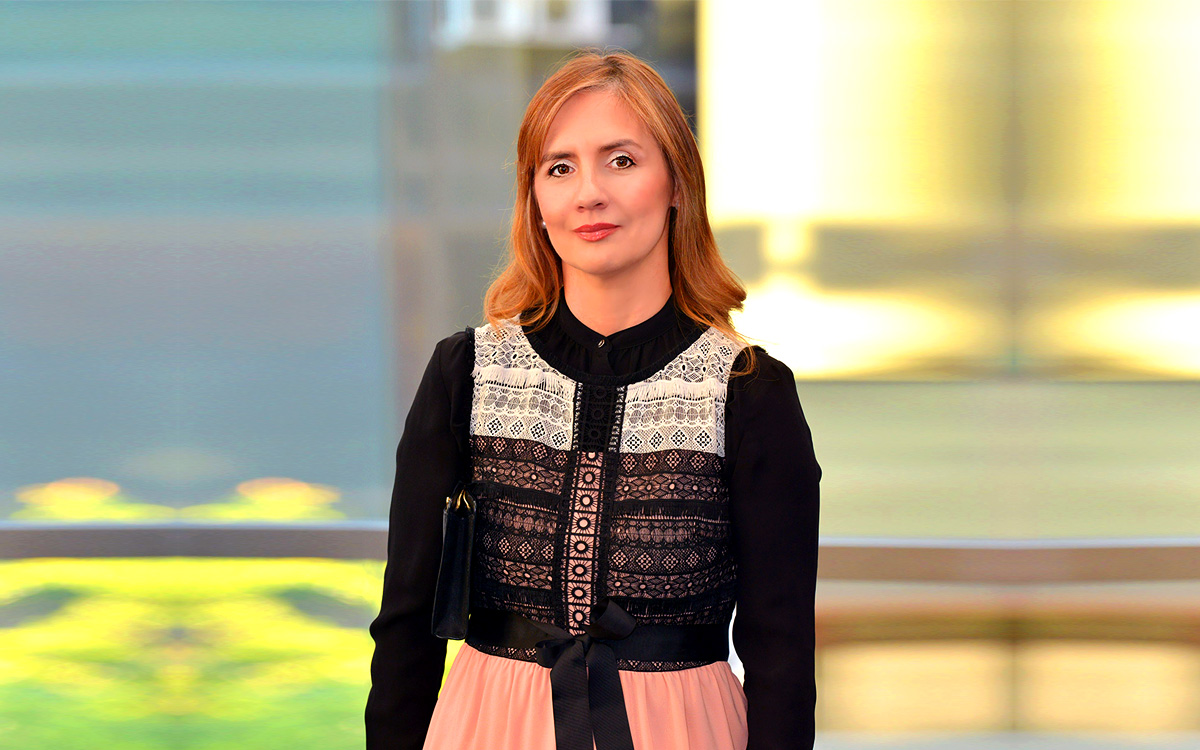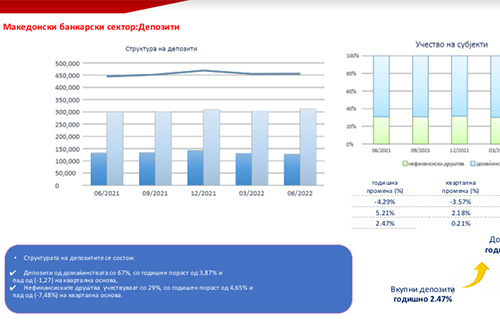Introduction speech by Anita Angelovska Bezhoska, Governor of the National Bank, at the marking of the 30 years of monetary independence
Distinguished President of the Republic of North Macedonia,
Distinguished Prime Minister of the Republic of North Macedonia,
Distinguished Minister of Finance,
Respected members of the Government
Dear guests,
It has long been said that history is a witness to the past, example and lesson to the present and lesson and warning to the future. Therefore, the celebration of the thirtieth anniversary of a momentous event, such as the monetary independence of the modern Macedonian state, is not just an honor and a motive for celebration. It is also an obligation, standing before the generations of devotees who have invested in what is today our modern monetary history, but also before the generations to whom we owe the future.
As the great Goran Stefanovski once said, “Identity is a story about who we are, why we are, and what we want.” Monetary independence and our currency – the denar are the central chapter in our story – an essential element of our identity. In 1991, the dream of an independent, sovereign and autonomous, modern Macedonian state came true. Yet, without the monetary independence that happened these days in 1992, without an independent central bank and without a national currency, our story would not have been complete. We must not forget this, neither today nor at any time in the future, not only to valorize the past, but also to be able to make now our contribution to the future of our authentic story.
What is more, we must never forget that we have an obligation to continue the story in this chapter, because as Stefanovski said, “identity is both work and responsibility.” It is the work and the responsibility that have been the exact postulates of the National Bank over the past thirty years. A lot of work, with full commitment, independence and professionalism in overcoming challenges and achieving goals under various, not always easy circumstances, in historical turmoil and milestones.
Not only as an occasion, but essentially we must keep reminding ourselves where we started off thirty years ago. At the beginning of this crucial monetary chapter of our story we started with almost zero foreign reserves, hyperinflation which in 1992 reached close to 1700%, recession, permanent depreciation of the domestic currency and general macroeconomic instability. The effect of all this was experienced by the citizens and all stakeholders in the economy, which was flagging until 1996. We must never forget it, because when the memory of historical events is lost, the potential for critical observation and making the right decisions in the present moment is lost as well.
But we do remember! We also remember the series of bold and decisive steps of the then policymakers towards macroeconomic stabilization, further supported by international financial institutions, especially through the first arrangements with the IMF and the World Bank back in 1993. The results were gradual inflation drop to single digits, enhanced foreign reserves, control of monetary aggregates, and consolidation of the fiscal sector. Crucially, in 1995, the monetary strategy of stable exchange rate of the denar was furnished – a strategy that is an anchor of stability of the Macedonian economy today.
The same year, soon after the adoption of the bank regulation and supervision, the banking system was rehabilitated, and later on transformed on a market basis. Six years later, the payment system reform was introduced, along with the building of other central bank capacities, including in the field of statistics, financial market operations, treasury operations and, of course, research as a significant support for the monetary decision-making.
All this created preconditions for the 25-year long monetary chapter of our story to be engraved with macroeconomic stability and compliance with international and European standards. For many years now, the European Commission, in its annual progress reports on monetary policy, has noted a high level of compliance with the European legislation.
However, in recent years, besides the constant improvement, we have also confronted and responded to a series of challenges, both domestic and global. Just to recall the crisis episodes of 2001, 2008 and 2016, when we as a central bank had to deal with a crisis of confidence, unfortunately prompted by numerous speculations. In all these episodes, we faced pressures on exchange rate and foreign reserves. As an example, during the 2008/2009 Global Financial Crisis we lost as much as a third of them. There were also periods of bank runs. For example, during the 2001 crisis, the deposits dropped by as much as 8% in a very short period of time.
Unfortunately, even in the recent period we have not been spared from serious challenges. The pandemic brought about economic losses, again required the use of foreign reserves to maintain stability of the domestic currency, as well as financial policies to support economy and maintain the banking system stability. This pandemic crisis, for various reasons, has made the issue of inflation relevant again, putting it in the focus of central banks.
And the still ongoing pandemic was followed by another major shock – the war in Ukraine, which is not only a human tragedy, but also produces economic cost in the form of inflationary pressures and slowdown of economic recovery.
All these crisis episodes remind us that the denar stability is a public good?benefit and crucial for the general economic stability. This illustrates how great our responsibility is as an institution that has a mandate to preserve its stability. But all other incumbents in society also have a responsibility to make their contribution, because we all benefit from the macroeconomic stability. Unfortunately, we know that in these turbulent times, speculations have occurred more than once and caused nothing but harm to you, us, the entire economy. On this special day for us, when we celebrate a jubilee that is important not only for the National Bank, but also for the homeland and the entire nation, standing in front of you, I once again declare – the denar stability is guaranteed!
Dear guests,
We must always appreciate and respect the achievements of the past thirty years and to praise highly the contribution of all those who have been part of the central bank and managed to build and maintain an institution that is independent, transparent, highly professional, and esteemed in the international community. But I also thank all the incumbents of our society who have been fully aware that an independent central bank is a prerequisite for the future of our story.
On behalf of the National Bank, allow me to express my genuine appreciation to the international financial institutions that lent our central bank a hand after the monetary independence and to this day have constantly supported us in our efforts to do our utmost for the Macedonian economy and citizens. Just as an illustration and example, I would like to remind you that in early 2019, we adhered to the highest statistical data dissemination standard of the IMF, as the eighteenth country in the world and last year, the European Commission adopted a Decision assessing that the banking regulations and supervision implemented by the National Bank are in line with the standards of the European Union. This puts us on the list of only 26 countries in the world that adhered to these standards.
Still, regardless of the commitment and the standards, without the trust and contribution of the citizens, no central bank can fully achieve its goals. That is why we are committed to transparency, both to them and to all economic agents, which is why transparency is one of our strategic goals. The National Bank is the second central bank in the world for which the IMF made an assessment according to the latest Transparency Code and we are glad that it found that our bank is implementing advanced transparency practices.
Dear guests,
Each historically significant anniversary puts us at a crossroads, and depending on what has already been achieved, requires from us to figure out which direction to take. Therefore, I must emphasize that regardless of how the country’s European integration process will proceed, the European standards will continue to be our guide to the European family of central banks. And then, when the European chapter of our story is completed and the denar remains our historical symbol of stability, I believe that it will be confirmed once again that as a central bank we have walked down the right path.
Since the 2008/2009 Global Financial Crisis and the experiences of the COVID crisis, in a time of accelerated changes on the world stage as a result of globalization, digitalization and financial innovation, the mandate of central banks has been constantly changing and expanding with new functions. All current and new functions and activities of modern central banks that protect the public interest are already part of our vision, but not as an activity that we forecast for the time future and distant, but as something we are already working on.
Among other things, we are particularly dedicated to financial education and inclusion given the importance of increasing knowledge about financial services, especially at a time of rapid fintech development, which would eventually provide easier access to finance for citizens and companies. In support of the fintech development, we drafted the first version of the national strategy, with a view of making our story a regional leader in this area as well.
Following the example of the European Central Bank, this year, when we celebrate thirty years of the introduction of the denar as our currency, we initiated activities to consider the introduction of a digital denar. If the analyses show that there is a need for introduction of a digital denar, hopefully, during some of the next celebrations of the day of monetary independence we will talk about the digital denar as an official means of payment in the country.
Dear guests,
The great Goran Stefanovski, whose words inspired me to open my address tonight, also reminded us that stories are the core of our lives and that they are not something that is planned, but something that is created and won every day – just like the freedom. Therefore, the National Bank will continue to write and add to the monetary chapter of our story, working professionally and responsibly for the benefit of the citizens, guided by the European central banking principles.
Congratulations on the anniversary and the celebration of the stable denar which is something that belongs to all of us, the citizens, the present and future generations!






